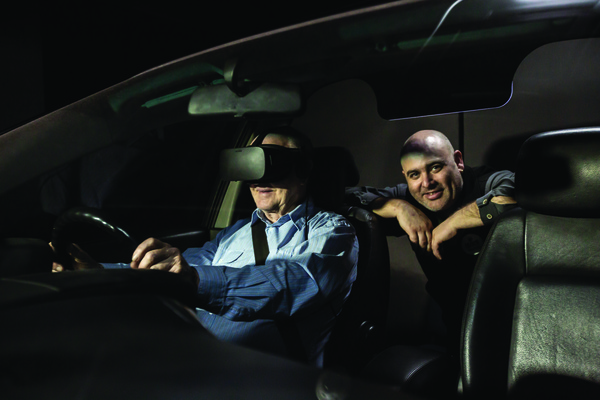
A “first-of-its-kind” $726,000 driving simulator inside a real car could improve the safety of older drivers, according to its Deakin University designers.
“You’re actually sitting in a car, in this case a Holden Captiva,” said lead designer Associate Professor Ben Horan.
“We cut that in half and then integrated all the technology inside it.
“So you’ve got the feel of the seats, your seatbelt, pedals, indicators, and we even put feedback into the steering wheel to give a real sensation of driving in different terrain.”
The simulated drive would give older motorists an idea of their performance, by measuring metrics such as reaction time and heartrate, Assoc Prof Horan said.
“It’s great for people who are keen to maintain their independence but also keep an eye on how they’re tracking.
“When you put the headset on you’re driving around the local neighbourhood and you see local landmarks.”
About 50 older people were involved in the development of the simulator, Assoc Prof Horan said.
“They gave feedback on things like accessibility – the car was chosen specifically so the seat was at an easy height to get in and out.
“But we also had to make sure that this technology was something older people were comfortable with using, that it was something relatively familiar and wasn’t too intimidating.”
The prototype could be the start of a fleet of adapted vehicles for driver testing, Assoc Prof Horan said.
“Of course this doesn’t replace the need for an older driver to see their regular GP for accurate testing, but it can be a fun, easy and accessible way to check in initially.”
Researchers hoped licensing bodies could use the technology to test and teach learner drivers, Assoc Prof Horan said.
“For example, it could be an effective update of the current hazards testing used when teenagers sit for their learner’s permit.
“It could also be used to help learners experience dangerous situations that they might not necessarily come across in the course of normal practice.”
Deakin’s School of Engineering recently completed the project for aged care provider Maclean Care, with $726,000 from Federal Government’s Dementia and Aged Care Services Fund.






